“General Secretary Gorbachev, if you seek peace, if you seek prosperity for the Soviet Union and Eastern Europe, if you seek liberalization: Come here to this gate! Mr. Gorbachev, open this gate! Mr. Gorbachev, tear down this wall!”
~Ronald Reagan

1851 – Harriet Beecher Stowe’s anti-slavery serial, Uncle Tom’s Cabin, or Life Among the Lowly, started a ten-month run in the National Era abolitionist newspaper.
It was originally intended as a shorter narrative that would run for only a few weeks. Stowe expanded the story significantly, however, and it was instantly popular. Because of the story’s popularity, publisher John P. Jewett contacted Stowe about turning the serial into a book. She had doubts about how well a book would sell but consented to the request.
Her fears were soon put to rest. Published in book form on March 20, 1852, the novel sold 3,000 copies on that day alone, with 300,000 copies sold in the first year.
The book was translated into all major languages and it would become the second best-selling book in the world during the nineteenth century, second only to the Bible.
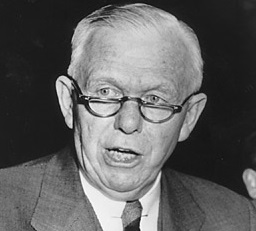
1947 – In one of the most significant speeches of the Cold War, Secretary of State George C. Marshall called on the United States to assist in the economic recovery of postwar Europe.
His speech at Harvard University provided the impetus for the so-called Marshall Plan, under which the United States sent billions of dollars to Western Europe to rebuild the war-torn countries.
By the time the program ended nearly four years later, the United States had provided over $12 billion for European economic recovery.
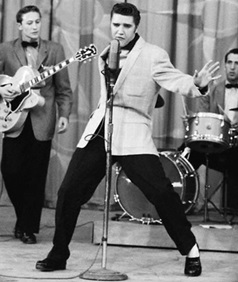
1956 – If Heartbreak Hotel made Elvis Presley the king of the radio and record stores during the spring of 1956, it was television that truly made him the King of Rock and Roll.
If any one moment might be called his coronation, it was his appearance on The Milton Berle Show on this night when he set his guitar aside and put every part of his being into a blistering, scandalous performance of Hound Dog, gyrating his soon-to-be-famous (or infamous) pelvis.
Reaction to Elvis’ performance in the mainstream media was almost uniformly negative. “Mr. Presley has no discernible singing ability. For the ear, he is an unutterable bore,” wrote critic Jack Gould in the next day’s New York Times. “The gyration never had anything to do with the world of popular music and still doesn’t.”

1963 – British Secretary of War John Profumo resigned his post following revelations that he had lied to the House of Commons about his sexual affair with Christine Keeler, an alleged prostitute. At the time of the affair, Keeler was also involved with Yevgeny Ivanov, a Soviet naval attaché who some suspected was a spy.
Although Profumo assured the government that he had not compromised national security in any way, the scandal threatened to topple Prime Minister Harold Macmillan’s government.
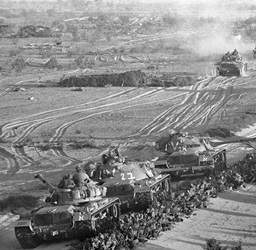
1967 – The Six Day War – pitting Israel against the neighboring states of Egypt (known at the time as the United Arab Republic), Jordan, and Syria – began.
Israel launched a series of preemptive airstrikes against Egyptian airfields. The Egyptians were caught by surprise and their entire air force was nearly destroyed with few Israeli losses, giving the Israelis air supremacy.
Simultaneously, the Israelis launched a ground offensive into the Gaza Strip and the Sinai, forcing Egyptian leader Gamal Abdel Nasser to order the evacuation of the Sinai.
Nasser induced Syria and Jordan to begin attacks on Israel but Israeli counterattacks resulted in the seizure of East Jerusalem as well as the West Bank from the Jordanians, while Israel’s retaliation against Syria resulted in its occupation of the Golan Heights.
In six days, Israel had crippled the Egyptian, Syrian and Jordanian militaries, having killed over 20,000 troops while losing fewer than 1,000 of their own.
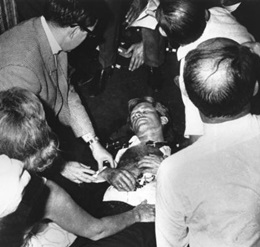
1968 – Senator Robert Kennedy, a leading critic of the Johnson administration’s policy in Vietnam, was shot at the Ambassador Hotel in Los Angeles after winning the California presidential primary.
Immediately after he announced to his cheering supporters that the country was ready to end its fractious divisions, Kennedy was shot several times by 22-year-old Palestinian Sirhan Sirhan.
As star athletes Rafer Johnson and Roosevelt Grier accompanied Kennedy out a rear exit of the hotel, the assassin stepped forward with a rolled up campaign poster, hiding his .22 revolver. He was only a foot away when he fired several shots.
Senator Kennedy died a day later.
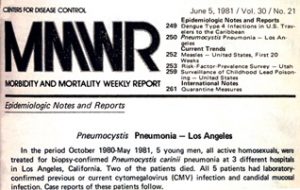
1981 – The Morbidity and Mortality Weekly Report of the Centers for Disease Control and Prevention reported that five people in Los Angeles, California, had a rare form of pneumonia seen only in patients with weakened immune systems.
They turned out to be the first recognized cases of AIDS.
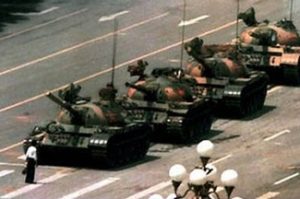
1989 – Suppression of a protest in Tiananmen Square was immortalized in Western media by the famous video footage and photographs of a lone man standing in front of a column of tanks driving out of the square one day after violently crushing the protest. The iconic photo would eventually make its way around the world.
As the tank driver tried to go around him, the “Tank Man” moved into the tank’s path. He continued to stand defiantly in front of the tanks for 30 minutes then climbed up onto the turret of the lead tank to speak to the soldiers inside. After returning to his position in front of the tanks, the man was pulled aside by a group of people.
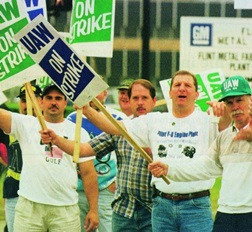
1998 – 3,400 members of the United Auto Workers union walked out on their jobs at a General Motors metal-stamping factory in Flint, Michigan, beginning a strike that lasted seven weeks and stalled production at GM facilities nationwide.
The UAW argued that GM had broken a commitment made in 1995 to spend $300 million to upgrade the facility. A week later, 5,800 more workers walked out of a Delphi parts plant, also in Flint, citing their concerns about GM’s outsourcing of labor to non-union plants in North America and abroad.
The labor stoppage cost the company more than $2.3 billion.

2001 – Tropical Storm Allison made landfall on the upper-Texas coastline and devastated the state.
The storm dropped heavy rainfall along its path, peaking at over 40 inches in Texas. The worst flooding occurred in Houston, where most of Allison‘s damage occurred: 30,000 became homeless after the storm flooded over 70,000 houses and destroyed 2,744 homes.
Downtown Houston was inundated with flooding, causing severe damage to hospitals and businesses. Twenty-three people died in Texas. Along its entire path, Allison caused $5.5 billion (2001 USD) in damage and 41 deaths.
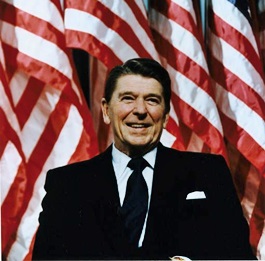
2004 – Ronald Reagan, the 40th president of the United States, died at the age of 93 after a long struggle with Alzheimer’s disease.
Opinions of Reagan’s legacy among the country’s leading policy makers and journalists vary. While proponents say Reagan “helped create a safer, freer world” and “he took an America suffering from malaise and made its citizens believe again in their destiny.” However, critics contend that Reagan’s “economic policies were mostly a failure.”
When Reagan left office in 1989, he held an approval rating of sixty-eight percent, matching Franklin D. Roosevelt for the highest rating for departing presidents in the modern era.
Compiled by Ray Lemire ©2018 RayLemire.com. / Streamingoldies.com. All Rights Reserved.